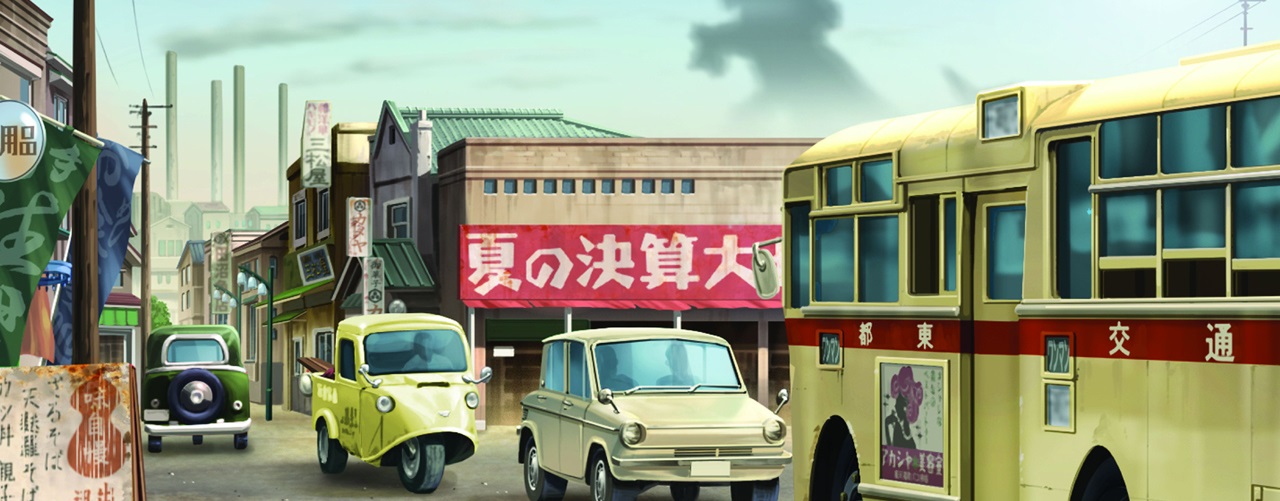This aspect of life is what initially drew us to Guild02’s Attack of the Friday Monsters! A Tokyo Tale, released on the 3DS eShop last August. The prospect of being able to play as a young kid in small-town Tokyo pretty much had us opening our wallet immediately. However, what we discovered after finishing it, is that A Tokyo Tale has the ability to simulate the summers of your childhood, and has a timeless, childhood appeal.
The game takes place in a small town outside of Tokyo during the 1970s, an era when we weren’t glued to our smartphones, and videogames were only just beginning to see commercial success. You and your family have just moved there this summer, your parents making a living by running the local laundromat while you make deliveries for people too busy to pick up their clothes themselves.
When you’re not running deliveries, you’re meeting the other kids in town - most of whom are eager to meet and play games with you. There’s a town bully, who by constantly asserting his dominance socially isolates himself; but he eventually comes around once he realizes it’s lonely at the top, and it’s pretty rad having friends.
Taken at face value, the town seems ordinary; but you and your friends’ tenacity to explore every nook and cranny reveals some mysteries: enormous foot prints, a crater seemingly caused by a meteor, and a plank bridge featuring an incomplete message.
Without delving too deeply into the story, we’ll say that the rest of the game is devoted to solving these mysteries with your best buds. And, yes, as the title of the game suggests, there are monsters involved.
Attack of the Friday Monsters! A Tokyo Tale evokes an incredible amount of nostalgia for childhood, where (forgive us for being corny) things were simpler. It captures the excitement of collecting trading cards, the thrill of your first crush, the pure, unadulterated imagination that only kids ignorant to the world outside them can possess. While the adults in the town fully understand the implications of the presence of monsters - and thus are terrified - you and your friends cheer them on, the fantasies in your Saturday morning cartoons finally becoming a spectacular reality.
You don’t need to have been a kid in Japan during this specific time period to be able to relate to these feelings. They all revolve around the sense of wonderment with the world inherent in children that slowly disappears as we grow into jaded teenagers and cynical adults.
And what better time to be a kid than during the Summer, a time when you’re free from school and aren’t obligated to do anything? In a lot of ways, A Tokyo Tale is a celebration of Summer, something its creator Kaz Ayabe is known for from his Boku no Natsuyasumi (My Summer Vacation) series on the PlayStation. And, much like in those games, the summer in A Tokyo Tale is depicted beautifully, from the sounds to the art. As you’re running down the sunny streets looking for the next big thing as cicadas chirp in the distance, it truly feels like summer.
From a gameplay perspective, A Tokyo Tale is basic. Most of what you find yourself doing is running around talking to people, eventually advancing the story by talking to the right person. You can play a rock-paper-scissors type of card game with your friends with the cards you collect around town (becoming their “boss” if you beat them, allowing you to force them to fall down whenever you please until they manage to beat you), but it amounts to little more than a mini-game. The dialogue is fun and deftly captures how children converse, but the lack of things to actually do would get boring pretty quickly, especially considering the actual method by which you collect cards is honestly pretty onerous. A Tokyo Tale lacks activities like fishing and cow milking that justify My Summer Vacation‘s existence as a console release. But, being an $8 3DSWare, the game isn’t long enough to overstay its welcome—it shouldn’t take you more than an afternoon to get through it, yet it achieves more than many games ten times its length.
A Tokyo Tale is designed to evoke powerful nostalgia; the minimal gameplay is merely a vehicle for it. The game expertly accomplishes its goal, without making the journey tedious. Instead, you’re dropped into a world that, if only for a few hours, does nothing short of make you feel like a kid again.
Look at the game solely from a gameplay perspective and you will be disappointed—honestly, there’s not much there—but you”ll also miss the point entirely. A Tokyo Tale is a game that is best appreciated by players with a keen sense of longing for their childhood. Immerse yourself in the game’s universe; relive the days when your biggest concern was what cereal your parents bought at the grocery story, and when summer truly meant freedom.




